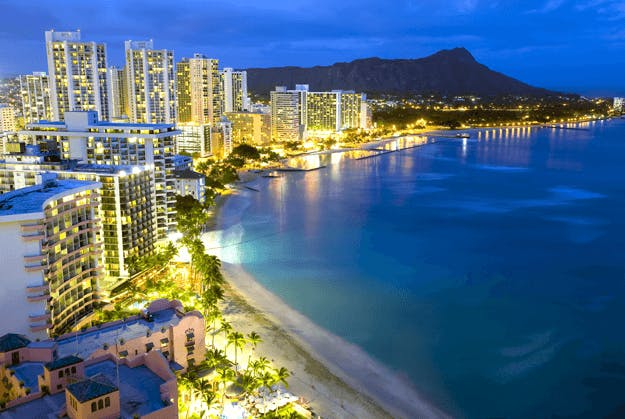
Aloha oukou! The beautiful islands of Hawaii greet everyone with joyfully warm weather, perfectly blue water and stunning volcanic views. It’s no wonder Hawaii is not just a favorite vacation spot for Americans, but for citizens of the world. And indeed, when one tries to imagine what a perfect island getaway might look like, Hawaii is usually at the top of the list. Barring any dramatic volcanic eruptions (fingers crossed), Hawaii will likely remain one of the best places to visit, and one amazing and unforgettable place to live. But just as many vacationers are flocking to the island in hopes of digging their toes in the sand, so too are the burglars. However, your average burglar would much rather dig into your nightstand or your safe than a sandy beach. Given that property crime rates are higher than on average in Hawaii than for the rest of the U.S., home security in Hawaii is a must. And if you want to avoid some “moi inoino” (restless sleep), it’s best to do your research first.
Home Security Provider Requirements for Hawaii
The Aloha State greets everyone equally. Hawaiians, both natives and transplants, are known for their kindness, charity and welcoming spirit. For better or worse (better, if you’re an average citizen), they’re not so welcoming to home security providers. Hawaii is an interesting case of regulations upon regulations, and home security providers somehow found themselves in the crosshairs. Perhaps Hawaiians are cautious because they have a bit of an unfortunate history of having things stolen from them. Who knows? The reality is, however, that home security providers have a lot of thorny leis to jump through.
Hawaii is one of a very few states that has a law on the books directly targeting home security providers and alarm companies. Seemingly borrowing a few ideas from Idaho, Hawaii straddles alarm companies with a surety bond requirement as part of opening up shop in the state. The bond requirement is noticeably low (only $5,000), and expires after 5 years as long as the company has maintained high standards. The bond is designed to help fund any issues that arise if the company fails to do its job. Not that we would ever want that to happen of course. But just in case.
The law contains some of the standard language that one might also find in local regulations. This includes wording dictating how alarm companies should handle false alarms, how they should keep records, their responsibility regarding maintenance, and regulations pertaining to how long and what kind of noise alarms they install can actually make. All of this is designed to ensure that alarm companies on the island are responsibly adhering to standard and acceptable rules and conduct. No complaints here!
Alongside the law that is specific to alarm companies, home security providers must also follow a few other rules designed for businesses in general. This includes obtaining requisite contractor’s licenses in order to perform work, as well as the necessary. electrician’s licenses to ensure that the electrical work is done correctly. Taken together, this shows that Hawaii is ready to roast a few pigs if necessary, but is adamant about only allowing high-quality businesses set up shop in their state. Given that the requirements on home security providers in the state all seem more than fair, and even give some elbow room for companies that have shown themselves honorable after several years, it’s hard to argue with Hawaii’s stance. It’s enough to make anyone break out into a hula dance or two.
A Hawaiian Home Security Cameras
Home security cameras are always a touchy subject. In many states, they’re sitting in a bit of a grey zone for legality. For Hawaii, that legality resides directly in why you’re using home security cameras. If your primary purposes are true and honorable (and self-protective), you’re not likely to run into any problems. However, it’s important to note that Hawaii takes its invasion of privacy laws very seriously. Specifically, if you install cameras with the intent or even the hope that they’ll catch something illicit, you may find yourself in a bit of a volcanic mess.
It’s also important to note that Hawaii disallows the installation of hidden surveillance cameras without permission. This relates to Hawaii’s laws that make it illegal to record a conversation without the consent of at least one participant. Hawaii is very adamant about enforcing these laws as well. This may make any resident a bit nervous about installing security cameras. There are any number of “what if” scenarios that might happen. If your intention is to put up security cameras, there are some good steps to take before doing so. First, make sure that you’re hiring an outside company to do the job for you. This way, you can ensure that your cameras are not pointing in an illegal direction. Secondly, contact your local police station for recommendations. And most importantly, get any legal advice from police in writing, if possible.
Putting up a few security cameras for home protection in Hawaii is a good idea. However, it also involves walking a fine line between legality and illegality. Make sure you’re taking the proper steps and following the golden rule: CYA!
Safety During Natural Disasters
There’s always something out there looking to ruin your fun in the sun. For Hawaii, that “something” is Mother Nature. She’s out there, and she’s on a rampage. We don’t need to tell you about some of the most obvious dangers that the natural world can (and probably will) bring down upon the tiny island state. But where would be the fun in that? So we’ll tell you!
Repeat after us: Hawaii’s volcanoes are not going to kill me! Although Hawaii is known for its volcanoes, a little science should help clear up some unneeded worrying. Hawaii is a volcanic island chain. The islands sit right on top of a very active tectonic plate. Yes, this does mean that there are active volcanoes in Hawaii. However, Hawaii’s volcanoes are a bit different. As shield volcanoes, they are not at risk of a Pompeii-style eruption. Instead, they slowly ooze until the tectonic activity has pushed them away.
But sitting on top of an active tectonic plate, and in the middle of the Pacific ocean, does mean several things for natural disaster safety. First, Hawaii is prone to earthquakes. Although the worst earthquake ever recorded in Hawaii was a 6.9 (1951), a potential for something worse is certainly possible. Likewise, a 6.9 is nothing to laugh at. The intensity is enough to topple some buildings, poorly structured bridges, and even throw buildings off of their foundations. The last major earthquake that struck the state was a 6.7 in 2006. Earthquakes are a common concern.
Naturally, Hawaiians must worry about the destruction of a tsunami as well. These occur frequently within the state, often once every 7 years. Although the worst tsunami in the state occurred a long time ago (1946) there is no reason to believe the next big one won’t come again. Tsunamis are caused by earthquakes, and can bring massive flooding, death and destruction in their wake.
So what’s a person to do? Run and hide? Fear not! Thankfully, most Hawaiians are knowledgeable of how to handle high tides and flooding. They’re an all-too-common occurrence on the island nation. But in case you’re not sure of how to handle these situations, here are a few tips. For flooding, always get to higher ground. Especially after an earthquake is reported, it’s best to assume the possibility of a tsunami, and get to higher ground when you can. Tsunamis can go 1,000 feet inland, or more, depending on the strength. It’s best to get several miles in land if possible, and at a higher elevation as well. Because of how they were formed, many of Hawaii’s islands have elevation gains.
Treat earthquakes in Hawaii as you would any other earthquake. If you are indoors, get under the cover of a sturdy piece of furniture to avoid falling debris. Stay clear of windows. If you are outdoors, head to a clear area that is free from falling trees, telephones poles or walls.
Hawaii puts up a tough fight for “most beautiful state”. If you ask us, it might just be winning. Even during winter, Hawaii hardly dips down below 79 degrees Fahrenheit, while struggling to top 90 in the summer months. And indeed, the state has something for everyone. Those who love tough mountain climbs will enjoy scaling a few old volcanoes. Those who love the beach have more beaches than they could shake a ukulele at. Those who want to commit a crime, however, might want to look elsewhere. Hawaii protects its citizens well, and that includes from burglars. Still, it’s best not to second guess your home protection needs. Even burglars enjoy an island vacation.

